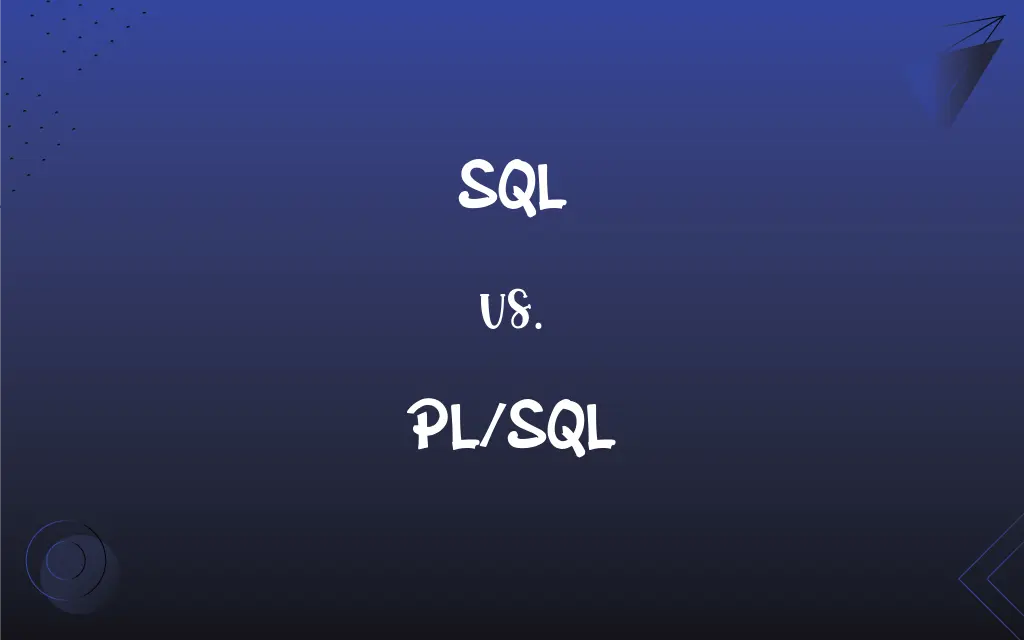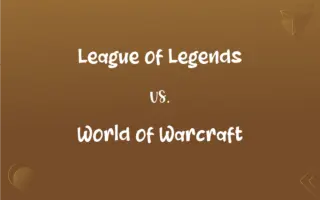SQL vs. PL/SQL: What's the Difference?
Edited by Aimie Carlson || By Janet White || Published on February 16, 2024
SQL is a standard language for accessing and manipulating databases, whereas PL/SQL is an extension of SQL for Oracle databases, adding procedural features.

Key Differences
SQL (Structured Query Language) is a domain-specific language used for managing and manipulating relational databases. In contrast, PL/SQL (Procedural Language/SQL) is an extension of SQL, developed by Oracle Corporation, and includes procedural programming features.
SQL is used for basic operations like querying, updating, and managing data in a database. PL/SQL, however, extends this capability by allowing for the creation of complex procedures, functions, and triggers within the database.
SQL is a declarative language, focusing on the "what" of data manipulation rather than the "how." PL/SQL, being a procedural language, provides control structures, variables, and the ability to write full programs, focusing on how the operations are performed.
SQL is universally used in almost all relational database systems, while PL/SQL is specifically designed for Oracle Database systems. This makes PL/SQL more specialized, with features tailored for Oracle's database architecture.
In terms of functionality, SQL is generally used for straightforward data manipulation and querying. PL/SQL's strengths lie in its ability to handle complex business logic and efficient processing of large volumes of data within Oracle databases.
ADVERTISEMENT
Comparison Chart
Type of Language
Declarative, used for querying and manipulating data
Procedural, an extension of SQL with procedural features
Usage Scope
Universal for relational databases
Specifically designed for Oracle databases
Capabilities
Basic data manipulation, querying
Advanced procedures, functions, and triggers
Control Structures
Limited, primarily focused on data manipulation
Extensive, including loops, conditions, and exceptions
Approach
Focused on "what" to do with data
Focused on "how" to do operations, allowing complex logic
ADVERTISEMENT
SQL and PL/SQL Definitions
SQL
SQL is a language for managing and manipulating relational databases.
The database administrator used SQL to retrieve customer data.
PL/SQL
PL/SQL is used for developing applications and software that interact with Oracle databases.
The inventory system was built using PL/SQL for database interactions.
SQL
SQL provides the means for accessing and altering database schema.
He altered the table structure using an SQL command.
PL/SQL
PL/SQL combines the data manipulation power of SQL with the procedural capabilities of programming languages.
They used PL/SQL to develop a custom reporting procedure.
SQL
SQL is used to query, update, insert, and delete data in a database.
The report was generated using an SQL query.
PL/SQL
PL/SQL enables the writing of sophisticated database triggers and functions.
A PL/SQL trigger was set up to validate new entries.
SQL
SQL is a standardized language for relational database management systems.
They learned SQL as part of their database management course.
PL/SQL
PL/SQL is a procedural language extension to SQL for Oracle databases.
The developer wrote a PL/SQL script to automate the data cleaning process.
SQL
SQL can be used to control access to data in a database.
The user's permissions were set up with SQL.
PL/SQL
PL/SQL allows the creation of complex stored procedures in Oracle databases.
He optimized the application by using PL/SQL stored procedures.
FAQs
Is PL/SQL limited to Oracle databases?
Yes, PL/SQL is specifically designed for and used in Oracle databases.
Can SQL be used in all databases?
Yes, SQL is a standard language used in most relational databases.
What is PL/SQL?
PL/SQL is an extension of SQL specific to Oracle databases with procedural features.
What is SQL?
SQL is a language for querying and manipulating relational databases.
What additional capabilities does PL/SQL offer?
PL/SQL allows for complex procedures, functions, and database triggers.
Are SQL and PL/SQL interchangeable?
No, they serve different purposes; SQL is for data manipulation, while PL/SQL includes procedural programming elements.
Is learning SQL necessary to understand PL/SQL?
Yes, understanding SQL is fundamental before learning PL/SQL.
Does PL/SQL support error handling?
Yes, PL/SQL has robust error handling capabilities through EXCEPTION blocks.
What can SQL do?
SQL can query, insert, update, and delete data in a database.
Can PL/SQL be used for database administration tasks?
Yes, PL/SQL can be used for various database administration tasks in Oracle.
Can SQL alone create stored procedures?
No, SQL does not support the creation of stored procedures; PL/SQL is needed for that in Oracle databases.
Can PL/SQL be used for scripting?
Yes, PL/SQL can be used for scripting complex database operations.
Is SQL sufficient for database programming?
SQL is sufficient for basic data manipulation, but PL/SQL is needed for complex programming tasks in Oracle.
How is performance affected by using SQL vs. PL/SQL?
PL/SQL can offer better performance for complex operations in Oracle due to its procedural nature.
Is SQL a procedural language?
No, SQL is a declarative language focused on data manipulation.
What type of language is PL/SQL?
PL/SQL is a procedural language, allowing for the writing of programs in the database.
Can SQL handle transaction control?
SQL can handle basic transaction control with commands like COMMIT and ROLLBACK.
How do SQL and PL/SQL interact in Oracle?
SQL commands can be embedded within PL/SQL code for data manipulation.
Are there online resources to learn SQL and PL/SQL?
Yes, there are numerous online resources and tutorials for learning both SQL and PL/SQL.
Are there any graphical tools for SQL and PL/SQL?
Yes, there are various tools like Oracle SQL Developer that support both SQL and PL/SQL.
About Author
Written by
Janet WhiteJanet White has been an esteemed writer and blogger for Difference Wiki. Holding a Master's degree in Science and Medical Journalism from the prestigious Boston University, she has consistently demonstrated her expertise and passion for her field. When she's not immersed in her work, Janet relishes her time exercising, delving into a good book, and cherishing moments with friends and family.
Edited by
Aimie CarlsonAimie Carlson, holding a master's degree in English literature, is a fervent English language enthusiast. She lends her writing talents to Difference Wiki, a prominent website that specializes in comparisons, offering readers insightful analyses that both captivate and inform.








































































